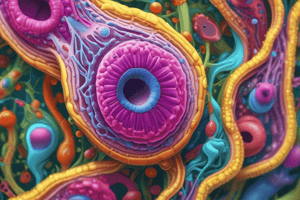Podcast
Questions and Answers
What do the outer blastomeres primarily contribute to in embryo development?
What do the outer blastomeres primarily contribute to in embryo development?
- Creation of the trophoblast (correct)
- Development of embryonic tissues
- Formation of the blastocoele
- Formation of the inner cell mass
Which type of junctions primarily hold the outer blastomeres together?
Which type of junctions primarily hold the outer blastomeres together?
- Adherens junctions
- Gap junctions
- Tight junctions (correct)
- Desmosomes
What initiates the formation of the blastocoele during embryo development?
What initiates the formation of the blastocoele during embryo development?
- Cleavage in the Fallopian tube
- Transport of fluids mediated by the zona pellucida (correct)
- Establishment of gap junctions
- Multiplication of inner cell mass cells
What is the role of the early pregnancy factor produced by the trophoblast?
What is the role of the early pregnancy factor produced by the trophoblast?
During which developmental stage does the embryo transition to producing its own genetic material?
During which developmental stage does the embryo transition to producing its own genetic material?
What is the primary consequence of mosaicism during cleavage?
What is the primary consequence of mosaicism during cleavage?
Which part of the blastocyst contains the embryonic pole?
Which part of the blastocyst contains the embryonic pole?
What differentiates polar trophoblast from mural trophoblast?
What differentiates polar trophoblast from mural trophoblast?
What is the primary outcome of the demethylation of paternal DNA during fertilization?
What is the primary outcome of the demethylation of paternal DNA during fertilization?
What is the primary advantage of the ampullary region of the Fallopian tube in fertilization?
What is the primary advantage of the ampullary region of the Fallopian tube in fertilization?
Which of the following accurately describes the process of cleavage after fertilization?
Which of the following accurately describes the process of cleavage after fertilization?
Which enzyme is released by the acrosome to aid spermatozoa in penetrating the corona radiata?
Which enzyme is released by the acrosome to aid spermatozoa in penetrating the corona radiata?
What role does the zona pellucida play in preventing polyspermy?
What role does the zona pellucida play in preventing polyspermy?
Which statement best describes the composition of the zygote after fertilization?
Which statement best describes the composition of the zygote after fertilization?
What is the role of ZP3 in the fertilization process?
What is the role of ZP3 in the fertilization process?
In which phase of fertilization does the spermatozoon begin to release enzymes from its acrosome?
In which phase of fertilization does the spermatozoon begin to release enzymes from its acrosome?
What is the result of compaction during early embryonic development?
What is the result of compaction during early embryonic development?
Which statement regarding the acrosomal reaction initiated by the zona pellucida is true?
Which statement regarding the acrosomal reaction initiated by the zona pellucida is true?
What happens to the spermatozoon after it attaches to the oocyte's plasma membrane?
What happens to the spermatozoon after it attaches to the oocyte's plasma membrane?
How is variation in the human species achieved through fertilization?
How is variation in the human species achieved through fertilization?
Which statement best describes the final stage of the sperm's entry into the egg?
Which statement best describes the final stage of the sperm's entry into the egg?
What begins approximately 30 hours after fertilization?
What begins approximately 30 hours after fertilization?
What physiological change occurs in the spermatozoa when penetrating the zona pellucida?
What physiological change occurs in the spermatozoa when penetrating the zona pellucida?
Which layer proliferates along the inside of the trophoblast to form the parietal endoderm?
Which layer proliferates along the inside of the trophoblast to form the parietal endoderm?
What structure is NOT useful for nutrients to humans during embryonic development?
What structure is NOT useful for nutrients to humans during embryonic development?
As of the 13th day of development, what happens to the vitelline sac?
As of the 13th day of development, what happens to the vitelline sac?
Which structure surrounds the amniotic cavity by mesoderm during development?
Which structure surrounds the amniotic cavity by mesoderm during development?
What is the outer wall of the blastocyst formed by?
What is the outer wall of the blastocyst formed by?
What is the body stalk's role during the early stages of embryonic development?
What is the body stalk's role during the early stages of embryonic development?
What does the hypoblast contribute to in the embryonic structure?
What does the hypoblast contribute to in the embryonic structure?
What is the primary role of the extraembryonic mesoderm in the formation of the villi?
What is the primary role of the extraembryonic mesoderm in the formation of the villi?
Which of the following describes a potential risk involved with the exchange of blood materials between the fetus and the mother?
Which of the following describes a potential risk involved with the exchange of blood materials between the fetus and the mother?
What is the most common cause of spontaneous abortion during the first trimester?
What is the most common cause of spontaneous abortion during the first trimester?
During which gestational week is the incidence of spontaneous abortion typically highest?
During which gestational week is the incidence of spontaneous abortion typically highest?
What could be a consequence if excess glucose enters the fetal circulation from maternal blood?
What could be a consequence if excess glucose enters the fetal circulation from maternal blood?
What is a factor that may increase the incidence of spontaneous abortion after the 10th week of gestation?
What is a factor that may increase the incidence of spontaneous abortion after the 10th week of gestation?
Which complication might arise if maternal medications cross into fetal circulation?
Which complication might arise if maternal medications cross into fetal circulation?
What is one reason a missed spontaneous abortion may go unnoticed?
What is one reason a missed spontaneous abortion may go unnoticed?
What is the role of the syncytiotrophoblast during implantation?
What is the role of the syncytiotrophoblast during implantation?
What does the trophoblast release to maintain the corpus luteum during early pregnancy?
What does the trophoblast release to maintain the corpus luteum during early pregnancy?
How does the decidual reaction affect the endometrium?
How does the decidual reaction affect the endometrium?
What is the primary function of the corpus luteum during early pregnancy?
What is the primary function of the corpus luteum during early pregnancy?
What homeostatic mechanism do decidual cells engage in during implantation?
What homeostatic mechanism do decidual cells engage in during implantation?
During early implantation, what might a woman mistakenly interpret as a menstrual period?
During early implantation, what might a woman mistakenly interpret as a menstrual period?
Which statement about the cytotrophoblast is correct?
Which statement about the cytotrophoblast is correct?
What potential role do anti-invasive factors from decidual cells play?
What potential role do anti-invasive factors from decidual cells play?
Flashcards
Where does fertilization occur?
Where does fertilization occur?
Fertilization typically takes place in the ampullary region of the fallopian tube. This area has folds that slow down the egg's movement, providing a conducive environment for sperm to meet the egg.
What is the role of hyaluronidase?
What is the role of hyaluronidase?
Hyaluronidase, released by the acrosome of the spermatozoa, breaks down the hyaluronic acid in the corona radiata, allowing sperm to reach the zona pellucida.
Why is the zona pellucida species-specific?
Why is the zona pellucida species-specific?
The zona pellucida contains proteins, mainly ZP3, that are specific to a particular species. This prevents fertilization by sperm from different species.
What is the purpose of the acrosome reaction?
What is the purpose of the acrosome reaction?
Signup and view all the flashcards
What happens in the perivitelline space?
What happens in the perivitelline space?
Signup and view all the flashcards
How does the spermatozoa attach to the oocyte?
How does the spermatozoa attach to the oocyte?
Signup and view all the flashcards
What happens to the sperm after fusing with the oocyte?
What happens to the sperm after fusing with the oocyte?
Signup and view all the flashcards
What is polyspermy?
What is polyspermy?
Signup and view all the flashcards
Trophoblast
Trophoblast
Signup and view all the flashcards
Inner Cell Mass
Inner Cell Mass
Signup and view all the flashcards
Blastocoele
Blastocoele
Signup and view all the flashcards
Early Pregnancy Factor
Early Pregnancy Factor
Signup and view all the flashcards
Embryoblast
Embryoblast
Signup and view all the flashcards
Cleavage
Cleavage
Signup and view all the flashcards
Maternal-to-Zygotic Transition
Maternal-to-Zygotic Transition
Signup and view all the flashcards
Mosaicism
Mosaicism
Signup and view all the flashcards
Male pronucleus formation
Male pronucleus formation
Signup and view all the flashcards
Zygote formation
Zygote formation
Signup and view all the flashcards
What does fertilization accomplish?
What does fertilization accomplish?
Signup and view all the flashcards
Zona pellucida function
Zona pellucida function
Signup and view all the flashcards
Blastomeres and morula
Blastomeres and morula
Signup and view all the flashcards
Compaction
Compaction
Signup and view all the flashcards
Inner and outer blastomeres
Inner and outer blastomeres
Signup and view all the flashcards
What is the epiblast?
What is the epiblast?
Signup and view all the flashcards
What is the hypoblast?
What is the hypoblast?
Signup and view all the flashcards
Amniotic cavity
Amniotic cavity
Signup and view all the flashcards
Yolk sac
Yolk sac
Signup and view all the flashcards
Heuser's membrane
Heuser's membrane
Signup and view all the flashcards
Extraembryonic mesoderm
Extraembryonic mesoderm
Signup and view all the flashcards
Chorion
Chorion
Signup and view all the flashcards
Extraembryonic coelom
Extraembryonic coelom
Signup and view all the flashcards
Syncytiotrophoblast
Syncytiotrophoblast
Signup and view all the flashcards
Cytotrophoblast
Cytotrophoblast
Signup and view all the flashcards
Lacunae
Lacunae
Signup and view all the flashcards
Decidual reaction
Decidual reaction
Signup and view all the flashcards
hCG (Human Chorionic Gonadotropin)
hCG (Human Chorionic Gonadotropin)
Signup and view all the flashcards
Pro-invasive
Pro-invasive
Signup and view all the flashcards
Anti-invasive
Anti-invasive
Signup and view all the flashcards
What is the amniotic cavity?
What is the amniotic cavity?
Signup and view all the flashcards
What are tertiary villi?
What are tertiary villi?
Signup and view all the flashcards
What is the role of the placenta in material exchange?
What is the role of the placenta in material exchange?
Signup and view all the flashcards
What is spontaneous abortion?
What is spontaneous abortion?
Signup and view all the flashcards
What are the most common causes of spontaneous abortion?
What are the most common causes of spontaneous abortion?
Signup and view all the flashcards
What is the role of adhesion molecules in implantation?
What is the role of adhesion molecules in implantation?
Signup and view all the flashcards
Why are there higher incidences of spontaneous abortion in embryos with certain conditions?
Why are there higher incidences of spontaneous abortion in embryos with certain conditions?
Signup and view all the flashcards
What are the possible causes of spontaneous abortion after 10 weeks?
What are the possible causes of spontaneous abortion after 10 weeks?
Signup and view all the flashcards
Study Notes
Fertilization
- Egg size: The egg cell is significantly larger than the sperm cell, about 10 million times larger in volume.
- Meeting place: Fertilization occurs in the ampullary region of the Fallopian tube. The folds in the uterine tube slow down the egg and create an optimal environment for sperm.
- Phase 1 of Fertilization: Sperm travel through the corona radiata (granulosa cells) aided by hyaluronidase (released from the acrosome). The sperm then moves to the zona pellucida. Uterine tube enzymes may also aid this process.
- Phase 2 of Fertilization: Sperm binding to the zona pellucida, specifically to ZP3 proteins. The acrosome releases enzymes (like acrosin). The sperm head fuses with the acrosome's anterior part in response to increased intracellular pH. Sperm penetrates the zona pellucida and arrives in the perivitelline space. Only one sperm will attach to the oocyte's plasma membrane.
- Phase 3 of Fertilization: A single sperm attaches to the oocyte's microvilli using Izumo1 (on the sperm) and Juno (on the egg). This triggers the fusion of the membranes. Mitochondria of the sperm are excluded from the egg cytoplasm.
- Phase 4 of Fertilization: Prevention of polyspermy (multiple sperm entry). The egg membrane depolarizes quickly after one sperm enters. Cortical granules are released into the perivitelline space causing hardening of the zona pellucida making it impenetrable to other sperm.
- Phase 5 of Fertilization: Oocyte completes meiosis II. Two pronuclei (from the egg and sperm) are formed. Meiosis is completed.
- Other key facts:
- Paternal mitochondria are eliminated after fertilization
- Mutations in Mitochondrial DNA can cause diseases
- Increase in calcium concentration causes cortical granule release.
- Increased permeability in the sperm's nucleus allows chromatin spreading to occur
Cleavage
- Cleavage Definition: Series of cell divisions that increase the number of cells in the zygote. Cytoplasm doesn't increase in size during cleavage.
- Timing: Cleavage begins around 30 hours after fertilization. Mammalian cleavage takes days.
- Blastomeres: Resulting cells from cleavage.
- Morula: 16 blastomeres form a solid ball called a morula. (takes 3 days);
- Blastocyst: The morula develops into a blastocyst, containing a fluid-filled cavity (blastocoele). The outer layer is called trophoblast and inner cells form the embryoblast. (takes 4 days).
Blastocyst and Implantation
- Polarity: The blastocyst is polarised– it has an embryonic pole and an abembryonic pole.
- Trophoblast: The outer layer, responsible for implantation and placenta formation
- Inner cell mass: This layer is responsible for the formation of the embryo.
- Implantation: The blastocyst implants in the uterine wall. The embryo attaches to the endometrium in a location where it's ready, aided by adhesion molecules.
- Invasion: The blastocyst penetrates the endometrium. It doesn't reach the myometrium. Syncytiotrophoblast helps erode the endometrium.
- Immunotolerance: The embryo is a semi-allograft; the endometrium produces cytokines (like LIF) to promote tolerance.
- Early pregnancy factor: The trophoblast produces this before implantation. This helps protect the embryo from the mother's immune system.
- Decidua: The uterine tissue surrounding the implanting blastocyst is called decidua.
Maintenance of early pregnancy
- Corpus luteum: Produces progesterone to maintain the uterine environment.
- hCG: Human Chorionic Gonadotropin is produced by the trophoblast keeping the corpus luteum functioning (important for the first 10 days). This can be detected in maternal blood or urine by day 10.
Ectopic Pregnancy
- Abnormal implantation: Implanted outside the uterus, usually in the fallopian tube.
- Potential complications: Rupture of the fallopian tube and internal haemorrhage.
- Signs and Symptoms: May be mistaken for other conditions, especially in the early stages.
- Importance of diagnosis: Timely diagnosis is critical to prevent potentially serious complications.
Second Week of Development
- Bilaminar Embryo: The inner cell mass separates to form the epiblast and hypoblast.
- Amniotic Cavity: Forms from the epiblast.
- Yolk Sac: Forms from the hypoblast.
- Extraembryonic Coelom: Forms the cavity between the yolk sac and the trophoblast.
- Chorion: The outer layer is called chorion, inside this the cavity is called chorionic cavity.
- Primitive Blood Vessels:
- Develop in the extraembryonic mesoderm.
- Important for placental development.
Studying That Suits You
Use AI to generate personalized quizzes and flashcards to suit your learning preferences.




